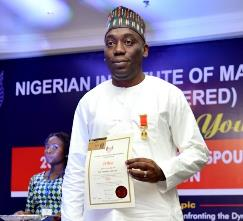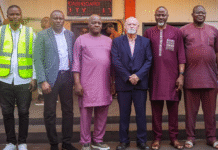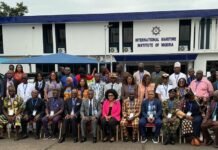…To Save N36bn Yearly from NIMASA Floating Dockyard
…To Serve as Training Vessel for Nigerian Maritime University
…Disbursement of $124m CVFF Begins 2019
John Iwori
Nigeria will not procure any training vessel for the training of her cadets, the Director General, Nigerian Maritime Administration and Safety Agency (NIMASA), Dr. Dakuku Peterside has said.
Peterside’s position is coming on the heels of the clamour in several quarters that it would pay Nigeria, nay Nigerians more if the Federal Government procures a training vessel for the training of hundreds of cadets churned out annually through the National Seafarers Development Programme (NSDP) and the Maritime Academy of Nigeria (MAN), Oron, Akwa Ibom State.
Proponents of the need to procure the training vessel argued that the huge foreign exchange lost to the training of cadets overseas in addition to the money paid to foreign ship owners for their sea time experience would be saved if the Federal Government procures a training ship.
Though the exact amount has not been made public, the Federal Government is presently paying millions of United States of America (USA) dollars to foreign ship owners across the globe to enable Nigerian cadets acquire sea time experience on board their ships.
Findings by Maritime Bits show that sea time are mandatory for the acquisition of certificate of competency (CoC) by seafarers.
Peterside however picked holes in the clamour, pointing out that the procurement of training ship for the training of Nigerian cadets has a lot of loopholes that need to be addressed.
The NIMASA helmsman who stated this at an interactive session with journalists in Lagos, argued that it was better to have Nigerian cadets in a trading vessel rather than a training vessel.
His words: “It is better to have our cadets in a trading vessel instead of a training vessel. This is because placing them in a training vessel is like they are still in the classroom. It is in a trading vessel that cadets can really have the much needed practical experience instead of a training vessel that will still look as if they are still learning theory in the classroom.
“We are not alone in this challenge of getting a training vessel. We are rubbing minds with other countries to see how we can bridge the gap. This is due to the fact that procuring the training vessel is only one side of the coin. A robust plan on the maintenance of the vessel must be put in place; otherwise we will not achieve the desired results”.
Peterside also revealed that the multimillion dollar floating dockyard owned by NIMASA will save Nigeria millions of dollars in capital flight once operational.
According to him, the facility which would be operated on a Public Private Partnership (PPP) model will be located at a facility of the Nigerian Navy. The floating dockyard would commence operations immediately after the commissioning by President Muhammadu Buhari. When fully operational, Nigerian ship owners and their foreign counterparts would no longer need to take their vessels outside the country for dry docking.
He revealed that Nigeria loses up to $100 million annually, even as he added: “This is because when our ship owners need to dry dock their vessels, they mostly take them to neighbouring countries like Ghana and Cameroun thus spending avoidable forex. When this facility is fully operational, it has the capacity to dry dock any vessel in the country and save the much needed foreign exchange”.
He explained that the facility would be operated in conjunction with the builders as technical partners just as he assured that it would create thousands of jobs for teeming Nigerian youths as well as provide training opportunities for seafarers.
Peterside also disclosed that the floating dockyard would also be available as a training facility for the students of the Nigerian Maritime University, Okerenkoko, Delta State and other maritime institutions in the country.
“We are planning to ensure that the permanent location of this facility would benefit our students for training and we have also engaged the builders to manage the facility for a one year period at a Naval facility while further arrangements are being worked out”, he said.
He noted that efforts are being made to create enabling environment for the growth of indigenous participation in shipping.
The NIMASA helmsman said that the agency is working on a special foreign exchange intervention for vessel parts acquisition and loan repayment processes to enable indigenous operators compete favourably with their foreign counterparts.
He added that there is a team working with the Central Bank of Nigeria on how best this policy can be implemented besidesworking towards the disbursement of the Cabotage Vessel Financing Fund (CVFF) which would give room for a full-fledged Cabotage regime with more job opportunities created.
On the much awaited disbursement of the CVFF, he said it would be disburse to qualified Nigerian ship owners in 2019.
Though he did not specified the exact date the CVFF which has already yielded $124 million would be disburse to beneficiaries, Peterside stated that the agency would avoid the mistakes of the past.











